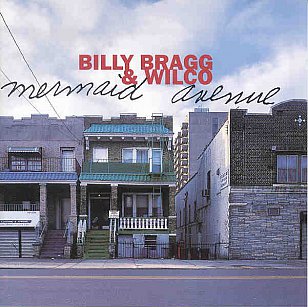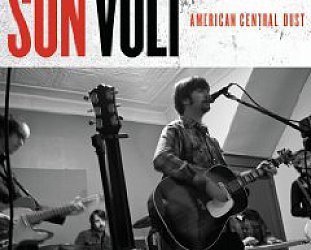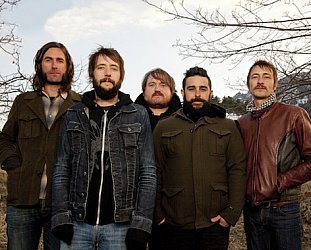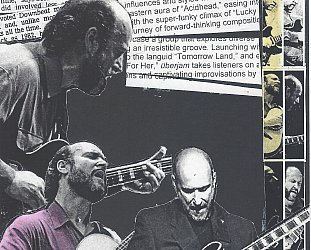Graham Reid | | 5 min read
Jeff Tweedy and Billy Bragg: California Stars

From the rollicking singalong which opens the new Mermaid Avenue album by Billy Bragg, you know something is different. There’s Bragg and the American band Wilco in a swaggering tale of looking for booze and, to put it delicately, female companionship.
From there on it’s a strange trip with Bragg and the band: an old man’s teenage reminiscences of taking a girl’s blouse off in a hollow tree; Christ For President; a song for Ingrid Bergman with a salacious subtext . . .
Aside from being a thoroughly enjoyable album shot through with memorable songs, some melancholy moments and the occasional surreal Dylanesque lyric (“high poker, low joker, ninety-nine a zero”), Mermaid Avenue demands a rethink of one of the great songwriters and political voices of this century.
And it isn‘t Bragg.
The man who wrote the words Bragg and Wilco’s Jeff Tweedy sing is that dustbowl balladeer Woody Guthrie, best known for writing This Land is Your Land and Bound for Glory, the inspiration for the young Bob Dylan and middle-aged Bruce Springsteen, and whose image is frozen in Depression-era photographs of him playing a battered acoustic guitar on which is the now legendary message, “This machine kills fascists.”
But rude’n’boozy songs, some fired up pop'n'roll and more than just a hint of Dylan’s Highway 61? This isn’t the worthy Woody who appears in the history books as some proto-socialist and protest singer.
It’s something much more contemporary -- and that’s hardly surprising since Guthrie lived in New York City (on Mermaid Avenue in Coney Island) and didn’t die until 1967, the same year as Sgt Pepper's and the second Velvet Underground album.
Even so, this doesn't sound like Woody, and that’s because Bragg and Wilco were given a stack of previously unreleased lyrics -- most written in the late Forties and early Fifties -- by Guthrie's daughter Nora with a view to re-presenting her father to a new generation.
"We're not being revisionist," says the cheerfully matey Bragg. "We are hacking away 50 years of people trying to make him a saint or a communist.
"We're cutting down to the real person who had moments of terrible doubt, as in Another Man Done Gone, went out with his seamen buddies [that opener Walt Whitman's Niece], whose love of his wife was part of his whole apprerciation of the role of women -- and wanted to bed Ingrid Bergman.
‘“That’s a lot of Guthrie, but it was all him and you can’t have one without the other.”
Bragg says the project -- a collaboration with Guthrie, not a tribute album he insists -- began when Nora Guthrie was working in her father’s archive and saw former Waterboy Mike Scott turned away when he wanted to go through the thousands of papers, lyrics and film footage.
“She was frustrated to see her father made precious and reduced to an icon. He was an iconoclast, not an icon.”
So she approached Bragg after he impressed her at a Guthrie tribute concert and delivered some of the scribbled lyrics. When he realised they were complete lyrics and not fragments, he was enthusiastic but, by his own admission "started off pulling out what I thought were good Guthrie songs -- then within hours realised there was exceptional stuff here, like Ingrid Bergman.
"Nora helped me to overcome my initial feelings of being daunted by taking on this huge icon because she had already worked out what she wanted to do and that was, ‘The legend is over there and we’re going over here where everything is unknown. So everything you know about Woody, forget'.”
Because the songs came from Guthrie’s later years the slate was clean on arrangements, and Bragg points to a liner scribble about tempo on one of the lyrics as a breakthrough. It reads, “supersonic boogie.”
Calling in Wilco, whose crossover country-rock albums have won consistent critical acclaim, Bragg enthusiastically recorded 40 tracks and, being a man apart from the legend -- he knew Guthrie’s famous songs but little about his life -- took his own perspective.
“I don’t think this is a job for a Guthrie obsessive because if you were, you’d ignore ‘supersonic boogie’ as an aberration because they only occur once. You need to be someone like Nora who can say, ‘Go forward with this, don’t be hidebound.”
What Guthrie wrote, however, were words without obvious choruses so Bragg and Tweedy were obliged to find them within the lyrics.
“Woody came from the English folk-song tradition, songs of 30 verses and no reprise. It helped to know that because it gave me my parameters. At one end you had that Elizabethan ballad tradition, at the other ‘supersonic boogie' and everything in between is permissible.
“I would argue he’s the last of that ballad tradition and on the cusp of where folk music stops being folk and became music where people know who wrote it. He was the first singer-songwriter.”
Bragg also says he learned that Guthrie was “an urban character and previous to this project most of us would envisage him as a bit player in the film Grapes of Wrath. I have to tell you the same man could justifiably be a bit player in On the Town when Frank Sinatra and Gene Kelly go to New York in 1949 and end up in Coney lsland -- where Woody lived.”
The song on the album Bragg is most proud of is one Tweedy sings, a 90-second Another Man’s Done Gone spontaneously recorded late at night with just piano backing.
“That is the key lyric on the album and we were reaching back and affirming what he wrote when he didn’t have a deai or a career, just had a family, and was aware he was dying, yet felt in some way what he was doing would last.
“Our job was to take the idea forward, but in that one moment we reached back to the man himself and kept the faith with him, with Marjorie his wife who kept the lyrics, with Nora who set up the archive . . .
“By recording that and locking in to that particular emotion l felt we underscored the entire project with his lyric, ‘But I feel like this scribbling will stay’.
“And nobody would have thought if you added Billy Bragg to Woody Guthrie you would have ended up with Mermaid Avenue and I’m happy with that.
“I feel I’ve overcome expectations about myself and Woody -- and he hasn’t made his last record, this is just the first for 50 years.”







post a comment